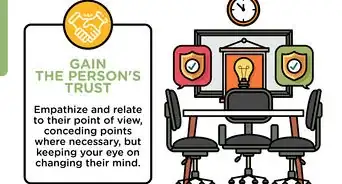X
wikiHow is a “wiki,” similar to Wikipedia, which means that many of our articles are co-written by multiple authors. To create this article, 10 people, some anonymous, worked to edit and improve it over time.
This article has been viewed 26,912 times.
Learn more...
Before you can convince people to do things for you, you'll need to convince them that doing so will somehow benefit them. This can be accomplished by both giving them what they want and setting conditions that make it easier for them to think of giving into your wants.
Steps
Part 1
Part 1 of 2:
Give Them What They Want
-
1Understand the psychology. Giving people what they want and need can make them more inclined to listen to the requests you make of them.[1]
- This isn't a matter of putting people into your debt. Doing one major favor for someone may make that person feel indebted to you, but once he or she repays the favor once, the interaction ends.
- Instead, you need to demonstrate a continual effort to meet the needs of the other person without making him or her feel obligated to return the favor. When others perceive you as a generous person, they might have more positive feelings for you in general, which may allow them to feel more positive about doing things for you.
-
2Listen. Most people find it easier to talk than to listen, but when they talk, they want to feel as though they're being listened to. Listening to others' wants and needs can make them feel supported.
- Venting about one's problems and needs can begin the process of emotional healing. By allowing someone to tell you what's on his or her mind, you are already providing a favor and endearing yourself to that person.
- Listening also makes it easier for you to react to wants and needs. When you are told what someone needs, you know what you will need to supply for that person. Be careful, though, since people often confuse their wants and needs. For instance, someone may think that he or she needs sympathy (pity) when that person actually needs empathy (understanding).
Advertisement -
3Attach your request to their need. If you can convince someone that fulfilling your request will satisfy his or her need, that person might become more eager to help you.
- Bribing someone can only have limited success because his or her desire has no direct connection to yours. Without that direct connection, that individual has no emotional investment in your request.
- Linking both desires directly creates emotional investment in your request. For example, you might offer to cook someone's favorite meal if that person agrees to shop for the groceries. The other individual gets what he or she desires (a meal) only because of the involvement he or she played in the process (buying the groceries).
-
4Choose the right environment. People are generally less inclined to do something when they feel uncomfortable. Making the environment as comfortable as possible can set others at ease and encourage them to take on a slight inconvenience for your sake.[2]
- When asking someone for a favor, do so in an environment that is familiar and comfortable for that person.
- It may even help to approach that person on his or her own turf. People generally feel as though they have the upper-hand in their own home or office. If you can muster the courage to ask someone when he or she feels empowered by the environment, that person is less likely to feel hostile toward your request.
-
5Create a sense of belonging. Humans are social creatures, so most people have some desire to belong and feel socially accepted.[3]
- If you can make people feel that doing something will give them a place within a larger group, they might feel more positive about doing it.
- Consider tackling an activity together with someone to create a social bond with him or her. Similarly, you can encourage someone to trust you by first demonstrating that you trust that person.
- When you make a request, do so using nouns ("be a sponsor") instead of verbs ("sponsor now"). Nouns make people think of group identity at a subconscious level.
-
6Present a challenge. Nearly everyone possesses the instinct to improve and become the master of their own environment. Reasonable challenges encourage people to pursue this instinct.
- Link a reasonable challenge to your request. The challenge must be something that can actually be accomplished without being too easy.
- Give people as control over the pursuit of that challenge. As they pursue it, provide occasional feedback to keep them motivated. This feedback should mix praise with objective criticism.
-
7Reward them. People respond well to continual sources of reward, so building a reward system into your request may make it seem more desirable.
- Depending on the favor, the reward might be as simple as a meaningful compliment.
- For larger tasks, make sure that the individual knows about the reward waiting at the completion of the task. When people have something to work toward, they generally work harder.
Advertisement
Part 2
Part 2 of 2:
Convince Them to Help You
-
1Understand the "Benjamin Franklin Effect." According to the Benjamin Franklin Effect (aptly named because Benjamin Franklin supposedly discovered it), a person who has done a favor for you once is more likely to do another favor for you later.
- This principle plays into the subconscious thought processes of the human mind. Once you have done someone a favor, the human brain is wired to perceive that person as a likeable individual. The more positive you feel about someone, the more inclined you will be to act on his or her behalf.
-
2Encourage them to invest. The actual investment can be tangible or intangible, but either way, you need to convince the other person to make a small investment before you can convince him or her to make a large investment.
- Once someone invests in you once, that individual begins to care about you. The more someone cares about you, the more he or she will be willing to invest again later on.
- Provoke this sense of investment by asking for a small favor early on. Ask to borrow something or request advice on something they have an interest in.
-
3Establish behavioral patterns. Habits are hard to break, so someone who is in the habit of doing things for you might be more likely to continue doing things than someone who hasn't developed that sort of habit.
- Start the process as early as possible to maximize the effect. Shortly after you meet someone you know you'll need a big favor from, begin asking for small favors.
- There is a limit to this, however. If you are continually asking for favors, failing to show gratitude, or otherwise being obnoxious, people will probably cut ties with you altogether.
-
4Approach them with a positive mood. People generally respond to positivity with more positivity. By approaching someone in a positive mood when you ask for something, you can encourage that person to feel positive, too.
- Instead of jumping directly into the request, spend time working that person up into a positive mood. Greet him or her with a smile. Make the other person laugh or talk about things that make him or her happy.
- Once the other person is in a good mood, make your request.
-
5Change the story. People tend to view their own lives as a story and prefer a certain level of consistency within that story.[4]
- If you understand the stories people tell themselves, you can more easily convince them to change one small part of it to your benefit.
- Sharing stories can influence change. If one person hears a second person adequately promote a quality in his or her story, that first person is more likely to adapt his or her own story to include that quality, as well. For instance, a homebody might take a trip after hearing someone else share a story that links self-discovery to travel.
-
6Play on instinct. Basic human instinct drives everyone, even though people aren't always aware of it. A better understanding of human instinct will make it easier for you to use instinct to your advantage.
- Fear is one instinct that people tend to act on. This isn't limited to the fear of danger, either; the fear of loss can also push people into acting. If you can make someone fear the possibility of losing an opportunity by turning your request down, you can encourage that person to give your request more consideration.
-
7Make it easier to accept. The human brain draws plenty of conclusions without much deep thought, so if you can trick the mind into quickly believing that something is beneficial, that conclusion probably won't be questioned later on.
- Avoid surprises. People question less when things work as they expect them to.
- People tend to respond negatively to information they disagree with, but if you agree with them about something first, they are generally more willing to listen to your opposing side.
Advertisement
References
- ↑ http://www.lifehack.org/articles/communication/the-secret-to-getting-people-to-do-what-you-want.html
- ↑ http://lifehacker.com/5869772/how-to-manipulate-people-to-do-what-you-want-without-abandoning-your-ethics
- ↑ http://www.psychologytoday.com/blog/brain-wise/201303/how-get-people-do-stuff
- ↑ http://www.huffingtonpost.co.uk/2014/06/13/house-of-cards-frank-underwood-getting-people-to-do-stuff_n_5491525.html
About This Article
Advertisement








































































